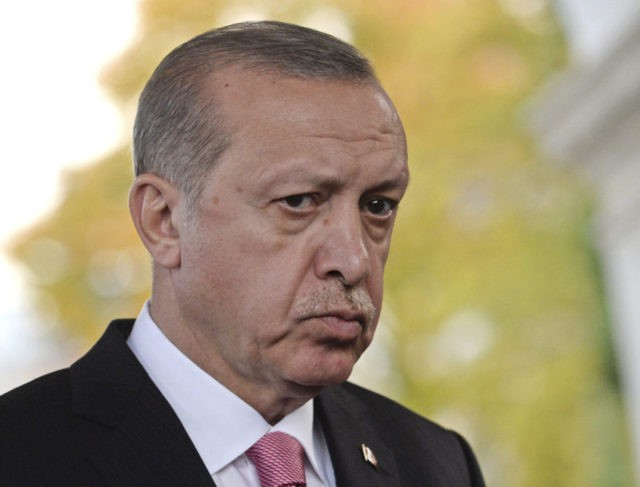A Turkish singer will spend ten months in prison after being convicted this week of the crime of “insulting the president.” Zuhal Olcay stood accused of changing the lyrics to one of her hits songs during a concert to condemn President Recep Tayyip Erdogan’s policies.
Olcay, also known throughout the country as an actress, admitted to the court that she had inserted Erdogan’s name into the song “Boş Vermişim Dünyayı” (“I Let Go of the World”), but denied that she intended to insult him, according to the Turkish newspaper Hurriyet. The newspaper notes that a video surfaced of Olcay performing live and adding to the song, “Recep Tayyip Erdoğan, it’s all empty, it’s all a lie, life will end one day and you’ll say ‘I had a dream.’”
Prosecutors also claimed that Olcay made an “insulting hand gesture” while singing about Erdogan, though Hurriyet does not specify what the gesture was or whether it was related to the song at all.
Turkish courts convicted Olcay on Thursday as per Turkish Penal Code Article 299, which reads:
(1) Anyone who insults the President of the Republic shall be imprisoned for a term of from one to four years.
(2) (Amended by Law 5377 dated 29 June 2005/Article 35) Where the offence is committed in public, the sentence shall be increased by one sixth.
(3) Initiation of a prosecution for this offence shall be subject to authorization by the Minister of Justice.
Prosecutors sought the maximum sentence of four years for the actress, but judges lowered the punishment to nearly one year.
According to her website, Olcay came to fame working in the Istanbul theater industry as an actress in the 1970s and ’80s, famously portraying Argentine first lady Eva Perón in the musical Evita in 1989. She turned to music full-time with an album in 2002 and has also been a consistent presence on Turkish television.
Turkey has long been home to a vibrant television, film, and music industry. Founded as a secular republic by Mustafa Kemal Atatürk in 1923, Turks – particularly those in the major cities, Istanbul and Ankara – have widely embraced Western cultural openness. Much of this has changed under Erdogan, whose Islamist Justice and Development Party (AKP) took control, with him as Prime Minister, in 2013. Erdogan has greatly expanded the powers of the presidency under his rule, an office originally functioning as a largely ceremonial one prior to his rule, and has urged a shift away from parliamentary democracy to a presidential system.
In early March, the Turkish Radio and Television Corporation (TRT) – the national broadcaster – published a list of 208 popular songs banned from government airwaves. The songs had been banned since 2016, but the public revelation only followed a recent parliamentary inquiry. While the government shut down secular voices, particularly Kurdish ones, government-friendly publications have placed a spotlight on “Islamic art,” instead.
Thousands of people have faced criminal charges for insulting Erdogan in the past five years, among them a man arrested for posting a meme on social media comparing Erdogan to the Lord of the Rings character Gollum, a German comedian who made fun of Erdogan on a German broadcast, two teens accused of taking down a poster with Erdogan’s face on it, and the editors of the Turkish magazine Nokta, who published a cartoon depicting Erdogan taking a selfie in front of the coffin of a Turkish soldier.
Opposition politicians have also found themselves facing criminal charges for insulting Erdogan in the process of making the case for their policies. In 2016, the head of the Republican People’s Party (CHP), the secularist party founded by Atatürk, was sued under Article 299 for calling Erdogan a “sham dictator” in the context of widespread arrests of opposition pro-Kurdish politicians.
Later that year, following a failed coup attempt against him, Erdogan announced a “one-off gesture of goodwill” in which he dropped all criminal charges he had levied for insults to his person, releasing 4,000 people from often cumbersome and time-consuming legal proceedings.

COMMENTS
Please let us know if you're having issues with commenting.